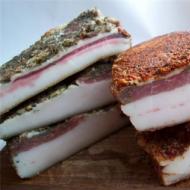
How to preserve cheese for a long time. How to make homemade cheese
Brynza is a type of delicious pickled cheese. It contains easily digestible calcium and many other trace elements and vitamins. How to store cheese without losing quality? Usefulness and quality are assessed by the mass fraction of fat. Cheese cheese with a fat content of 50% is considered the most delicious.
When buying, choose wisely
High-quality cheese is white or pale yellow in color, with a dense consistency, a minimal amount of voids, similar to cottage cheese, but does not break up into small pieces. A dried edge appears during long-term storage and partial loss of beneficial properties.
This is a pickle product
Under production conditions, this product is kept in brine (brine) for up to 60 days. To preserve the excellent fermented milk taste, after 20 days of aging the cheese is sent for sale. To protect it from spoilage, it is supplied for sale in special packaging with brine.
If the cheese is purchased in a vacuum container
At home, the use of brine is also provided.
- The cheese is transferred to a plastic container or glass jar.
- Fill with brine.
- Cover with a lid and place in the refrigerator, where it is stored for 2-3 weeks.
If there is no brine, then the cheese is tightly wrapped in foil or film. In this form it can be stored for no more than a week.
Pickled cheese is sometimes a little too salty. Therefore, before use, it can be soaked for several hours in chilled boiled water.
For long term storage
If the cheese was purchased without brine or there is not enough of it for storage, then it is absolutely not difficult to make it yourself at home.
Based on a three-liter jar:
- 1.5 liters of boiled, cooled water is poured into a container;
- pour 5 tablespoons of salt and completely dissolve;
- The salt concentration is checked using a well-washed egg: if its tip the size of a 10-ruble coin floats up, the brine is ready for use.
Brine cheese is stored at home in enamel containers, three-liter jars, and plastic containers for 2 weeks.
Take note
A long stay in lightly salted brine makes the cheese soft.
Over-salted brine cheese does not lose its usefulness, and excess salt is eliminated by simply soaking it in milk or water.
If there are no conditions and opportunity to prepare the brine, simply put the cheese in a plastic container. And if it continues to dry out, put it in the freezer of the refrigerator.
After defrosting, the taste of the cheese will decrease slightly, but it will be quite suitable for further use in cooking.
A little more about cheese
Do not buy this product in large pieces. Even if all the rules of storage in the refrigerator are observed, its best qualities are preserved on average for the first five days.
Before slicing, keep the knife in hot water for a few minutes - this will prevent the cheese from crumbling.
Fresh cheese is sometimes subjected to heat treatment (smoking), after which it acquires an exquisite taste and can be stored for up to a year.
Despite the high salt content, feta cheese is a very healthy product that allows you to preserve teeth, velvety skin, ease digestion, improve health and prolong youth.
Brynza is one of the most popular cheeses in our country, since the mechanism for preparing such a product at home allows you to produce it even yourself, if you have constant access to fresh milk. The finished cheese is good for your own consumption, for treating friends and acquaintances, and even for sale.
The only downside is that you can’t just store Brynza in the refrigerator for a long time: at least the cheese won’t be able to be kept fresh, and in the worst case, the product will become completely unfit for food. At the same time, knowledgeable people know how to store this fermented milk product for a very long time, and we will also try to figure out how to do this.

Long-term storage technique
Of course, if you bought just a little Brynza in the store, love it or have a clear idea of how to use it in the shortest possible time, then there is no need to invent anything, because the shelf life of the product in the refrigerator can reach several days. If the expected storage duration should be much longer, you will have to resort to one of four methods.
- The simplest thing is use brine, in which feta cheese is sometimes sold. This liquid is used in the process of making cheese, but due to its high salinity, it can store the product for a long time. If you use the same brine in which the cheese was prepared, then you don’t have to be afraid that the product will acquire some new flavor, because the taste in this case is identical. Some manufacturers sell Brynza directly with this brine, and if it is available, it should not be poured out under any circumstances - this is where we will store the fermented milk product. Combined with constant refrigeration, the quality of the cheese will remain high for several weeks.
By the way, the brine itself can be used as an unusual drink or as an additive to various dishes.

- If there is no “factory” brine, and the shelf life of the product needs to be extended from several days to two weeks, you can store Brynza in the same refrigerator, but packaged very carefully. For such purposes, the cheese head is usually wrapped in food foil and placed in a pan, which must be covered with a lid on top. For storage, you should choose a strictly enameled pan, while unprotected metal or any other utensil materials will not work.


- If the brine was not sold complete with the head, but you want to preserve the cheese for many months, you will have to prepare this brine yourself, especially since there is nothing complicated in this task. The exact proportion, interestingly, differs in different sources; apparently, it depends on the taste preferences of the authors, but for the first time you shouldn’t be particularly stingy with salt: you need to put at least a glass on a three-liter jar. The brine should be concentrated, because most of the volume of the dish will still be occupied by cheese, not liquid.
The head can be stored in concentrated brine even for six months, but for this the liquid will have to be changed monthly. You need to understand that during the settling process, Brynza takes part of the salt from the brine for itself, so each subsequent time the brine’s salinity is slightly reduced. For the same reason, you should not keep Brynza in brine for too long, since the concentration of salt in the cheese may ultimately turn out to be excessive.
By the way, only glass containers with a tight-fitting lid are suitable for soaking in brine.

You can find a lot of controversy on the Internet about whether it is possible to freeze Brynza, and the answer really depends only on how you plan to use it after defrosting. The fact is that due to the cold, the cheese loses its structure, and as a result, an attempt to cut it will end with it crumbling into small pieces. Many also claim that after freezing, Brynza partially loses its original taste.
However, if you need the product not for sandwiches or for a cheese plate, but, say, for a salad or any hot dish, then this will not be a particular problem. At the same time, the cheese is stored in the freezer not unpacked, but tightly wrapped in cling film or a plastic bag, otherwise the head may become completely deformed, and then it will have to be scraped off the walls.


Common Mistakes
As often happens, even a slight deviation from a proven recipe can result in the sudden failure of the plan. And complete ignorance of the recipe all the more often leads to the fact that the result is unsuccessful. They usually don’t buy much cheese, and therefore long-term storage is often required if a person suddenly leaves somewhere.

Let's take a closer look at how you can't store Brynza.
- Many people, afraid of oversalting the product, store cheese not in brine, but in ordinary boiled water. There is no logic in this: not only will plain water not protect against microorganisms, but the salts will also be washed out of the head, due to which it will become tasteless. It is worth soaking Brynza in plain water only if it has turned out to be excessively salty and needs to be “restored”, but this technique has nothing to do with long-term storage.
- Consumers in recommendations about wrapping Brynza in cling film and placing it in a pan with a lid is often limited to only the first step, although in fact the second is much more important: it’s better with a lid and without film than with film but without a lid. The fact is that the lid allows the cheese head to retain its moisture for as long as possible, and without it the product will simply dry out and become stale. A spoiled product can theoretically be saved by cutting off the hardened rind, but this already promises a loss in volume, and in the worst case, especially if the piece of cheese was small, a complete loss of the product.
- Plastic containers, as well as metal ones without an enameled surface, is unsuitable for storing Brynza by any of the described methods. True, the situation with plastic is somewhat simpler: cheese can be stored even in such a container, but it is better to limit the period of stay there as much as possible, otherwise a characteristic unpleasant aftertaste will appear.
To learn how to store cheese in brine, watch the video below.
Brynza is a soft pickled cheese. The product contains vitamins C, B1, B2, calcium, sodium, phosphorus, which determines its beneficial properties. But the benefits easily disappear if you approach the storage issue incorrectly. Read more about how to properly store cheese in the article.
What is special about soft cheese?
Traditionally, feta cheese is made from sheep's milk, but now production also uses cow's and goat's milk. The composition includes lactic acid starter and calcium chloride.
The final stage of preparation is soaking the product in a saline solution. Brynza is a cheese with a short ripening period (from 5 to 15 days). Its salinity depends on the duration of soaking.
Compared to other cheeses, feta cheese has a more delicate consistency, which is why there are strict requirements for maintaining a high level of moisture in it.
Do you know that…
Drying of the cheese leads to damage to its taste.
How to store in the refrigerator: container, timing
- The shelf life in brine is up to 75 days.
- Without it, the time period is reduced to 30 days.
As a rule, after purchasing a product, a person thinks about how to store cheese in the refrigerator. The main condition is to ensure the tightness of the container. Therefore, the best option is a container with a tight-fitting lid.

Like all brine cheeses, feta cheese does not have a rind that would protect it from environmental influences. This should be taken into account when storing it.
- Factory packaging. Before opening, the product can be stored for the entire period indicated on the label, after opening - up to 5 days.
- Enameled dishes. The shelf life will reach 14 days if you pack the cheese in foil and place it in a tightly sealed enamel container.
- Plastic container. Plastic dishes are not the best option for storage. In such containers the product remains edible for no more than 3 days.
Tip of the day
You should not use cling film, as it suffocates the cheese and loses its taste properties.
Can it be frozen? How to do it right
If it is not possible to consume the cheese before the expiration date, then a way to preserve the cheese for a long time will come in handy.
You can put the product in the freezer. First you need to pack it in cling film, a vacuum freezer bag or foil.
The shelf life in the freezer is up to 8 months. But freezing cheese is an extreme measure, since in the process it loses some of its beneficial properties and taste and begins to crumble. It can only be used for preparing, for example, salad.
Based on the above, the answer to the question of whether feta cheese can be frozen is ambiguous. You will have to decide based on the situation.

Just 100 g of feta cheese could provide the body's daily need for calcium, if not for the high salt content, which does not allow the product to be eaten in such quantities
How to store in brine. Simple recipe
It is recommended to purchase cheese in the “original” whey solution. But if this is not possible, then to maintain the taste and increase the shelf life of the product, you need to independently prepare the brine for the cheese.
- Raw brine. To prepare, you need to dissolve salt in boiled water at the rate of 1-2 tsp. for 1 glass of liquid. You will need enough water to completely cover the cheese in the container.
- Brine with herbs. Mix the dried ingredients in a saucer: cumin, red pepper, garlic. Add the resulting mixture to the salt solution, which was prepared using the above method. To taste, you can include mustard seeds.
It is better to keep cheese in a salt solution in a glass container. The expiration date will be:
- in the refrigerator for 2 weeks or more;
- without refrigeration for 48 hours (in a dark, cool place).
Note to the hostess
Before serving, cheese that has been stored in brine should be immersed in water or milk for 5 minutes. This will help remove excess salt from the product.
The higher the quality of the cheese, the longer it is stored, so you need to know the rules for choosing a product:
- High-quality cheese has a white milky color, elastic and soft consistency, slightly brittle, but does not break up into lumps.
- When cut, its porosity is visible: many small holes of irregular shape.
- The packaging should not be swollen or deformed.
- The presence of sticky crumbs in the product is unacceptable.
- A crumbly consistency and dry areas indicate that the shelf life is coming to an end, which means that the beneficial properties of the cheese are minimal.
- It is recommended to buy cheese with the whey in which it was matured. Such goods are protected from premature damage.
- The price of a product that is too low should alert you. There is a high probability that low-quality raw materials were used.
You can get more detailed information about choosing cheese from the video:
Not the freshest product: how to use
If the shelf life of the feta cheese is coming to an end, the cheese has become dry, then you need to keep it for 30-60 minutes in, or even better, in sour.
It is recommended to use stale product for baking. Exposure to high temperatures will kill bacteria. It is worth considering that the only beneficial qualities that will remain are the high calcium and protein content.
It is important to know!
If the cheese has become slippery to the touch, or a repulsive odor has arisen, then the product should not be eaten.
Knowing how to preserve cheese at home will allow you to avoid its rapid spoilage and undesirable health consequences from consuming an expired product. But it is best to purchase cheese in the required quantity, and not store excess.
Store correctly and be healthy!
Have you read the article? Please give feedback:
- Please rate the article and share it with your friends on social networks if it was useful and you learned something new.
- Supplement the material by writing a comment if you have your own experience in storage or disagree with something.
- Ask our specialist a question by clicking the button below and receive a qualified answer if you did not find it in the text.
Thank you in advance! It is important for us to understand that we are not working in vain.
Brynza is a favorite cheese in various cuisines around the world. It is served as an independent product, as well as as an addition to meat and vegetable dishes, as a filling for baked goods. It can also be eaten as a savory dessert with tea and coffee. To keep your purchase fresh and tasty, you need to know how to store cheese.
Traditionally, this soft cheese was made only from sheep's milk, but now cow's and goat's milk are also used for this purpose. Sourdough and calcium chloride are added to it, then soaked in brine for at least 25 days. The duration of this process determines how salty the cheese becomes.
Cheese contains a lot of calcium: just 110 g of product per day will help meet the body's daily needs.
The cheese is quite salty, so you should not consume it in large quantities, especially for those who have diseases of the digestive system.
The fermented milk product is sold with or without added liquid in vacuum packaging. When purchasing, inspect it carefully and pay attention to its integrity. If there is damage, the cheese is most likely starting to dry out. It is better to buy cheese in brine, so it will be easier to store. An important criterion is the percentage of fat content, optimally if it is about 50. The better the quality of the product, the longer it can be stored at home.
The color of the cheese should be white or slightly yellowish, it is quite dense in consistency, has no voids, does not crumble or crumble. Before slicing, warm the knife blade under hot water, this will help you get nice, even pieces of cheese.
Cold storage
Where and how to store cheese? In order for a healthy product at home to remain tasty and fresh for a long time, you need to keep the cheese in the refrigerator and preferably in brine. If you bought cheese in liquid, after opening, pour it into a glass container, put the cheese inside and close tightly with a nylon lid.
If you wish, you can make the brine yourself; to do this, prepare a 20% saline solution.
The cheese will absorb the required amount of salt, and this will extend its shelf life by several months.
Before using, simply soak the piece in fresh water.
If storing without liquid, wrap the cheese in foil to prevent drying out. Do not use cling film; the cheese must breathe. To maintain moisture, you can wrap the piece in a damp cloth. In the absence of preservatives, the cheese will become unusable in a week.
How to use cheese that is not fresh
If you need to save a large amount of cheese from spoilage, use the freezer. Place the whole piece there and cut from it as needed. This, of course, is an extreme method, the taste will suffer, but the product will be suitable for preparing various dishes.
It is better to add stale cheese to baked goods. Heat treatment will kill harmful bacteria, but only calcium will be left in it.

Important
- If you need to make the cheese less salty, soak it in boiled water or milk for two to three hours before eating.
- It is undesirable to store fermented milk products in boiled water for a long time; they will absorb excess moisture and begin to disintegrate.
- A raw egg should not sink in the product storage solution. If it floats, the salt concentration is optimal.
- In the refrigerator, keep the cheese in the back as close to the freezer as possible.
The shelf life of cheese is quite short. It takes a little effort to prolong it at home, but when purchasing it is better to limit yourself to a small piece and be happy to add cheese to your favorite dishes.
Your little brownie
Brined cheese made from cow, goat or sheep milk is feta cheese. This product is prepared by soaking it in brine for 2 months. This makes the cheese, although salty, healthy: it is rich in calcium and protein. But the disadvantage of this cheese is that it requires special storage conditions.
How to store cheese so that it does not spoil
Why do we need special storage conditions for cheese?
Not all lovers of this product know how to properly store feta cheese. And since it is most often sold without the brine in which it was prepared, its consumer qualities are soon lost. If stored improperly, the edges of the cheese become weathered and stale. And the common method of storing cheese in a plastic bag or cling film leads to spoilage of the product. The cheese becomes slippery, an unpleasant odor appears - it can no longer be consumed in this form.
Features of storing cheese
Before buying this cheese, you need to know how to store feta cheese at home so that it remains tasty and fresh. These rules will help you preserve this cheese well:
You need to buy only high-quality, fresh cheese. The packaging should not be swollen and the cheese should not crumble;
Cheese cheese, which is sold in a container with brine, is better stored. It should not be poured out; it keeps the product in the refrigerator for up to two weeks;
Some housewives who do not know how to store cheese fill it with clean water. But this method is only suitable for soaking cheese from excess salt. If you keep cheese in unsalted water for a long time, it will begin to crumble and spoil.
How to properly store cheese?
If in the same packaging in which it was sold, then after opening - no more than 5 days;
You can wrap a piece of cheese in food foil and put it in an enamel container with a lid - this way it stays fresh for two weeks;
You can store cheese in a plastic or enamel container with a lid for just two to three days.
















